C++ Problem:
The minimum number of 1's should be found in the result of the XOR operation between a randomly generated N Bit sequence (N up to 50) std::bitset<N> visit{0b01...110}; and a sequences of 1's, starting from std::bitset<N> ones{0b0},std::bitset<N> ones{0b1} and grows up to the MsB of visit so ones{0b111...111};
std::vector<int> countPenalty(std::bitset<N> set)
{
std::bitset<N> closing{0b0};
std::bitset<N> eins{0b1};
std::vector<int> countPen;
countPen.reserve(N);
while(std::bit_width(closing.to_ulong()) <= std::bit_width(set.to_ulong()))
{
std::bitset<N> tempSet = set ^ closing;
countPen.push_back(std::popcount(tempSet.to_ulong()));
closing <<= 1;
closing |= eins;
}
return countPen;
}
int main()
{
std::string s{"-11--111"};
std::bitset<N> visitorSet(s, 0, s.size(), '0', '1');
std::vector<int> penalties = countPenalty(visitorSet);
auto minRes = std::min_element(penalties.begin(), penalties.end());
std::cout << *minRes << std::endl; //2
return 0;
}
Tasks similar to that one can be found very often in job interview preparations or c++ coding homeworks or leetcode (some similar task description I saw one is mentioned below). But I read on stackoverflow that to use big std. bitsets for binary logic operations is not a efficient solution. Actually why not? But is there a more elegant way which doesn't need to many code lines? I mean nobody wants to code a super complicated code on a job interview. And isn't bitset a good solution especially since c++20?
"Real life context to the code":
There is a ticket counter with a person working there. It just makes sense to have the ticket counter open when there are also clients who want to buy a ticket. So there are two cases of penalties:
- the ticket counter is open but there is no client
- the ticket counter is closed but there would be clients.
They make every day a list if there where clients (yes 1,no 0) in the ith hour. This will look like the following ::string s{"01100111"}; for a day with 8 hours. Now there is the question if one should close the shop at specific hour to save money. The aim is to have as few penalties as possible.
Here a list of the visitors and the opening hours (0= ticket counter is open, 1= ticket counter is closed)
The XOR between the Visitor bitset and the opening/closing bitset gives me the set of penalties. There I can find the minimum of penalties which will show when it is best to close the ticket counter, to save money.

